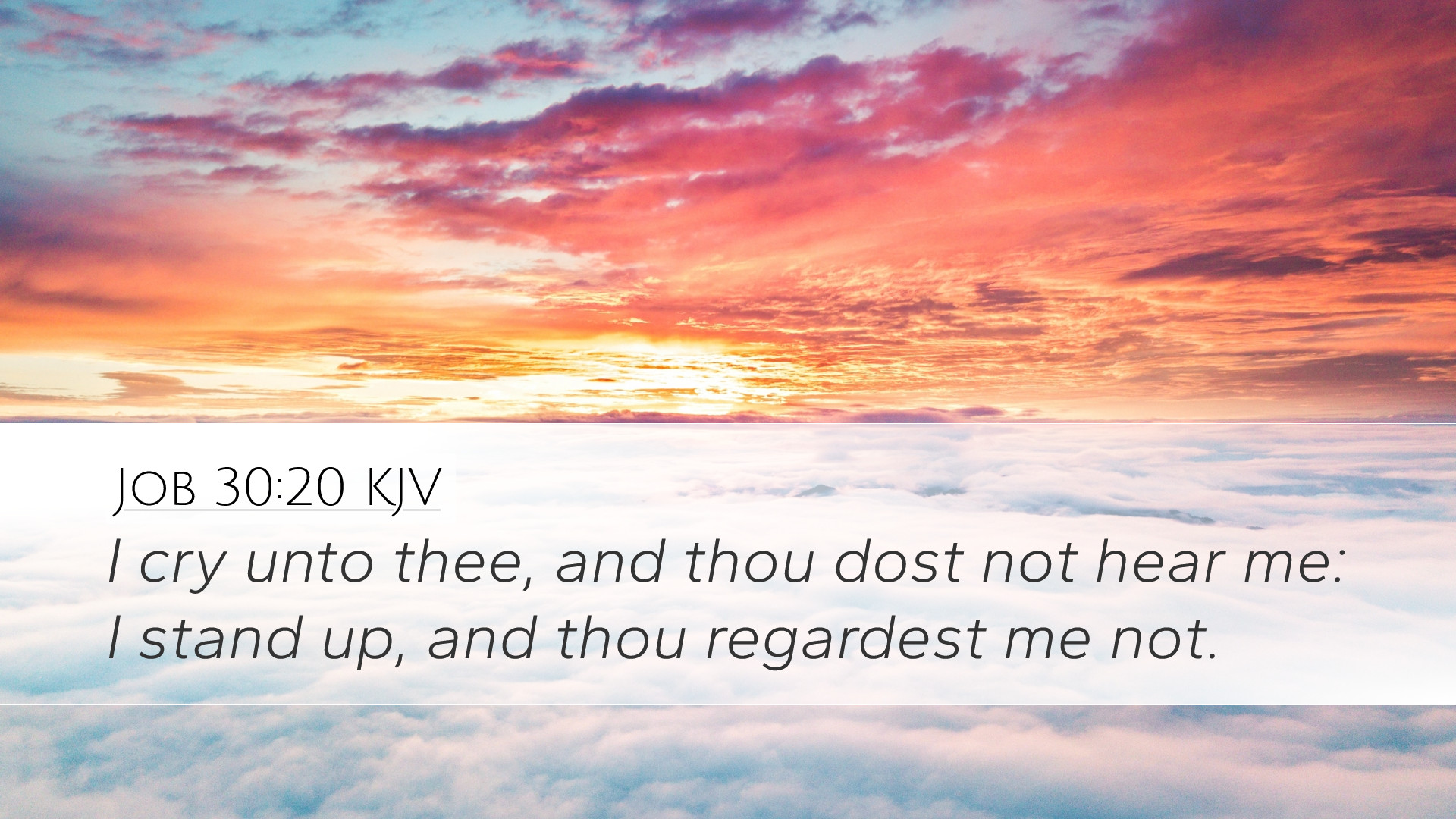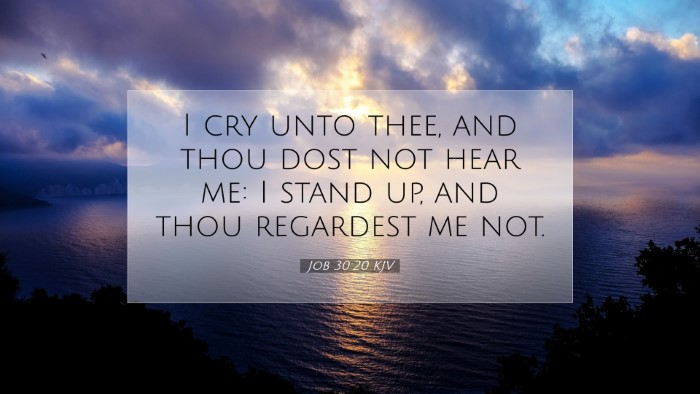Commentary on Job 30:20
Verse Text: "I cry out to You, God, but You do not answer; I stand up, but You merely look at me." (Job 30:20, NIV)
Introduction
The book of Job deals with profound themes of suffering, divine justice, and the nature of God. In Job 30:20, we witness Job's deep anguish and despair, as he feels abandoned by God in his hour of need. This verse encapsulates Job's desperate cry for attention from the Almighty, intensifying the suffering he has already endured. By examining this verse through the lenses of prominent public domain commentaries, such as those by Matthew Henry, Albert Barnes, and Adam Clarke, we can uncover deeper meaning and applications for today’s believers.
Contextual Overview
Job, after losing his wealth, health, and children, finds himself in a state of utter desolation. The surrounding chapters depict his friends attempting to rationalize his suffering through the lens of retributive justice—an idea that the righteous are rewarded and the wicked are punished. Job refutes this theology, insisting upon his innocence and expressing his frustration not just with his friends but ultimately with God.
Matthew Henry's Perspective
Henry interprets Job's cry as an expression of deep spiritual distress. Job feels that in the midst of his relentless suffering, God has become silent. He comments on the irony of Job's situation: he has cried out fervently, seeking a response from his Creator, yet it seems that God is unmoved. This silence from God adds a layer to Job's suffering—a feeling of abandonment that resonates with believers who experience trials.
- Divine Silence: Henry emphasizes that divine silence often comes during the most intense periods of trial. It is a test of faith, as believers must trust in God's sovereignty even when they cannot discern His purposes.
- Expectation of Response: Job's standing up represents his attempts to gain God's attention. Henry argues that Job's expectation for a response reflects humanity's innate desire for divine interaction during suffering.
Albert Barnes' Commentary
Barnes provides a meticulous analysis of the language and structure of the verse. He points out that Job's appeal to God indicates a recognition of God’s power to intervene, yet Job experiences an overwhelming sense of disconnection. Barnes elaborates on the psychological aspect of Job's lament, suggesting that such feelings are relatable to the faithful who encounter despair.
- Theological Implications: Barnes explores the theological question of why God sometimes remains silent. He poses that while Job's feelings are real, they are not always indicative of God's abandonment—rather, they bring to light the mystery of God's governance.
- Human Experience: He highlights that Job’s plea is universal. Many believers, when faced with trials, experience a similar feeling of marginalization in their faith journey, emphasizing the importance of community and support in such times.
Adam Clarke's Insights
Clarke’s commentary delves into the emotional depth of Job’s statement. He aligns with Matthew Henry in recognizing the relational aspect of Job’s cry; Job is not merely expressing a lament but is speaking to God as to a friend. Clarke highlights the import of Job's direct address to God, asserting that it illustrates a genuine relationship with the divine.
- Dialogue with God: Clarke emphasizes the significance of prayer and dialogue with God, even when responses seem absent. For Clarke, this dialogue signifies faith and the ongoing relationship of the believer with God.
- Hope Amidst Despair: He reminds readers that while Job feels the weight of silence, this does not equate to hopelessness. Job's continued call to God suggests that there remains a flicker of hope, an understanding that God's silence can be a profound part of the faith experience.
Theological Reflections
In light of these commentaries, several theological reflections emerge from Job 30:20:
- God's Presence in Silence: Throughout church history, many saints have attested to periods of divine silence. This suggests that such experiences can be part of the journey of faith and should not be interpreted as abandonment.
- The Nature of Suffering: Job’s suffering invites a broader examination of how suffering interacts with faith. While Job's friends suggest his trials are a punishment for sin, Job insists that suffering can occur without divine displeasure.
- The Need for Community: The importance of communal support is essential during seasons of suffering. Job’s friends, while misguided, demonstrate the human inclination to seek answers among one another—a reminder for the church to come alongside those in distress.
Practical Applications
For pastors, students, theologians, and scholars, reflections on Job 30:20 can lead to several practical applications:
- Pastoral Care: In times of crisis, pastoral care should recognize feelings of abandonment, as seen in Job. Addressing these emotions can help congregants find peace amid turmoil.
- Teaching on Suffering: Educators and pastors can equip others to understand the nuanced relationship between suffering and faith, moving away from simplistic interpretations of suffering as punishment.
- Encouragement of Honest Dialogue: Encourage congregants to engage in honest dialogue with God, mirroring Job’s approach. It allows believers to express genuine emotions within their spiritual journeys.
Conclusion
Job 30:20 encapsulates the raw and profound struggle between human suffering and the divine silence that often accompanies it. As evident from the rich insights of Henry, Barnes, and Clarke, this verse serves as a powerful reminder of the complexities of faith during trials. Ultimately, believers can find solace in the understanding that seeking God, even in silence, is an integral part of deepening one’s faith and grappling with the reality of suffering.


